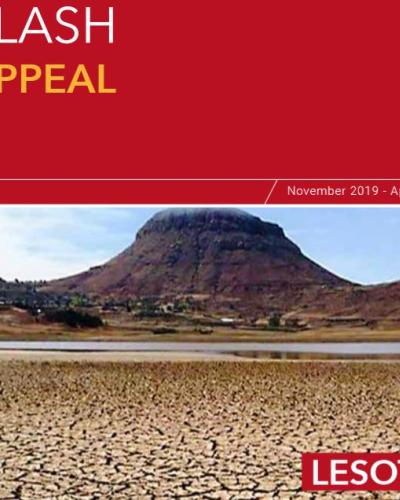Humanitarian Country Team Flash Appeal (November 2019 - April 2020)

The Government of Lesotho has declared a national disaster in response to the rapidly deteriorating situation. The 2018/2019 planting season was characterized by the late onset of rains and extremely hot temperatures, leading to poor harvests: production of major cereals has decreased by more than 60 percent compared to 2018, including a 78 per cent decrease for maize, 61 per cent for wheat, and 93 percent for sorghum. This follows a poor 2017/2018 season, leaving families across the country suffering from consecutive shocks. With the country forecast to receive below-average rainfall during the 2019/2020 season (October-March), the most vulnerable are now faced with the potential for three back-to-back failed harvests. More than 500,000 people in ten districts are now severely food insecure -including 433,000 people in rural areas (30 per cent of the rural population) and above 74,700 people in urban areas (13.3 per cent of the urban population). This is an increase of more than 64 per cent compared to the same time last year, when 308,966 people (257,283 rural and 51,683 urban) people were estimated to be severely food insecure.
At the peak of the lean season (January-March), it is estimated that 71,000 people will face Emergency (IPC Phase 4) conditions, with the highest numbers in Leribe and Maseru districts. People’s livelihoods - especially women’s - have been decimated by repeated droughts. Most of the rural population in Lesotho rely on agriculture for their income, leaving them highly vulnerable when droughts strike. This is particularly the case for women farmers, who have even less ability to cope with shocks as their productive capacity and asset base are considerably smaller than male farmers. In addition to the impacts on agriculture, the drought has debilitated livestock trading. Rangelands conditions deteriorated earlier than normal in August 2019, impacting on livestock body conditions, which had not fully recovered from the 2018/2019 lean season. This may affect livestock prices and the quantity and quality of wool and mohair is likely to be compromised. At the same time, disease outbreaks amongst livestock are threatening both animals and humans. An Anthrax outbreak in animals was reported in Maseru district from April to June 2019 where more than 100 people were exposed to the disease and given prophylaxis.





